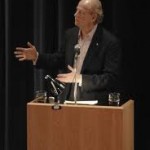My first look at this book (and its author, John Ralston Saul) was here, and the first chapter was summarized here.
Saul called Chapter 2 of The Unconscious Civilization – the second of the speeches he originally gave as the 1995 Massey Lectures in Canada – “From Propaganda to Language”. To bring (Western, or maybe even global) civilization to a more conscious state, to encourage genuine democracy and real citizenship in pursuit of the general good, he advocates fundamental changes in the way that we communicate, and in the role of
education in producing such true and meaningful expression. These are big ideas. Saul is often criticized for his sweeping generalizations. Even his fans might find occasional pronouncements positively tsunami-like in their breadth, force and where-did-that-come-from suddenness. This is also his greatest strength: he describes philosophical and historical forests to a public too often entranced by the trees.
And speaking of sweeping general statements, then, here are my no-more-than-500 words in summary of “From Propaganda to Language” by John Ralston Saul:

